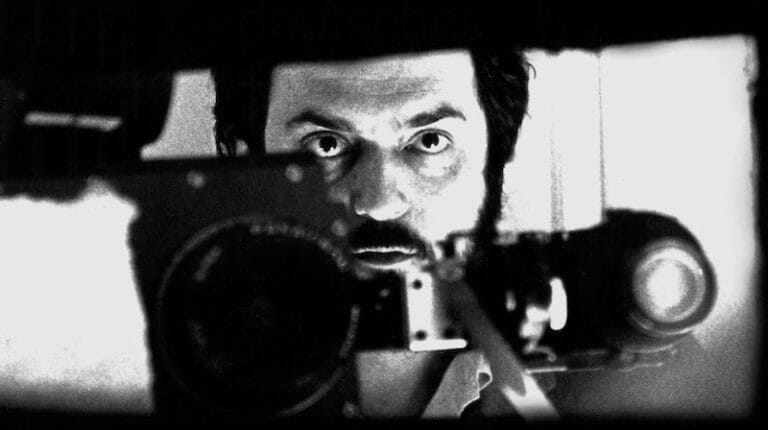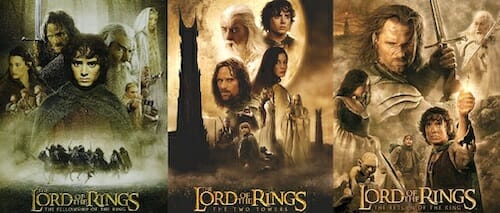By Ken Miyamoto · May 28, 2019

A master of cinema, Stanley Kubrick, shares adaptation screenwriting tips in a rare interview.
Welcome to our ongoing Learning from the Masters and Industry Insiders series where we seek out and feature excellent videos, interviews, and discussions of the art, craft, and business of screenwriting and pull the best words of wisdom, writing tips, and screenwriting advice.
When it comes to advice on adapting novels and short stories into screenplays, we turn to Movie Geeks United and their featured two-hour interview with the late, great auteur Stanley Kubrick. All of Kubrick’s films that he wrote were adaptations from novels or short stories, so it’s easy to say that he’s an expert on the subject.
We specifically feature his tips on screenwriting and adaptations within the video and elaborate on the interesting points he makes.
“The criteria starts off being… when you read it for the first time, that’s your only really pure experience with it… you have this tremendous advantage of reading something for the first time. Which is an experience that you never have again with the story. The first time is something with which you can never guess about.”
That’s an interesting thought regarding adaptations. When you’re writing original screenplays — which Kubrick stated that he didn’t think he could ever do — you never get to experience that first read of your story because that story came from you.
With adaptation source material, you can have that first pure experience.
So while you’re reading the book or short story that first time, forget about making notes and breaking down the book. Just experience that first read. Experience the characters and the story. When you do that, you’re allowing yourself to feel that emotional connection to it all, which will be the core of your adaptation of that material.
“[After the first read], then it just becomes a matter of, almost like a code-breaking of breaking the thing down to a structure that seems to be still truthful and not losing the ideas, the content, and the feeling of the book. And trying to get it into a much more limited time frame of a movie.”
The most important part of this statement is the process of breaking it down to a structure that doesn’t lose the core idea, content, and feeling of the book while getting it into the limited time frame of a film.
When you’re adapting a novel or short story, it’s not merely about taking the concept and making a movie out of it. The best adaptations are those that accomplish that while keeping the original spirit, ideas, and feelings that you felt within that first read of the story.
The Shawshank Redemption is one of the best adaptations in that respect.

As is Stand By Me.

Dani Blázquez
And the Lord of the Rings trilogy is perhaps the best overall adaptation we’ve seen, given the immense scope of the source material.

All three of these examples had significant exclusions and major changes to the source material, but they always stayed true to the core of it.
“It almost never is a question of, ‘What does this scene mean?’… if the thing is truthful, and you don’t feel anything about it that’s false, and if it’s interesting, and if it still feels like what you were feeling, I find it’s a much more intuitive process. More like what I would imagine writing music is like.”
He was debating somewhat with one of the moderators (which you can hardly hear in the video) who was inquiring about whether or not every scene should have a predetermined meaning.
That’s a familiar guru or pundit note — “Does the scene have meaning?” — that screenwriters often hear or read about.
Injecting meaning into each and every scene is an overly analytical approach. Kubrick is saying that it’s a more intuitive process. And to elaborate on that more, it’s important to remember that film is subjective. Everyone can interpret a different meaning within any given scene.
The vital thing to remember is that your scene needs to be truthful, in terms of the characterization, the plotting, and the story that came before it and will come after it.
“I like to read. Everything. Anything. I’ve come to realize that there’s so many books and so little time to read, that I now just go to a bookstore and take things off the shelf with my eyes closed. I just read almost anything that has possible interest, and if I don’t like it, I don’t keep reading it. That sort of chance encounter with a book is about the only way to do it because you cannot possibly read enough.”
A common question amongst screenwriters is, “How do you find the right book or story to adapt?” There is no answer. It’s usually the result of a chance encounter, followed by your pursuit of the rights. Sometimes those rights will be taken. Sometimes they’ll be costly. Sometimes they’ll be free.
Listen to this epic two-hour 1987 interview!
For all the latest from The Script Lab, be sure to follow us on Twitter, Facebook, and Instagram.
And become a member of TSL 360 to enjoy the LARGEST screenwriting education content library, featuring masterclasses, deep-dive interviews, and lectures from Academy Award-winning screenwriters, TV show-runners, producers, literary managers, agents, studio executives, and leading educators – all in one place.